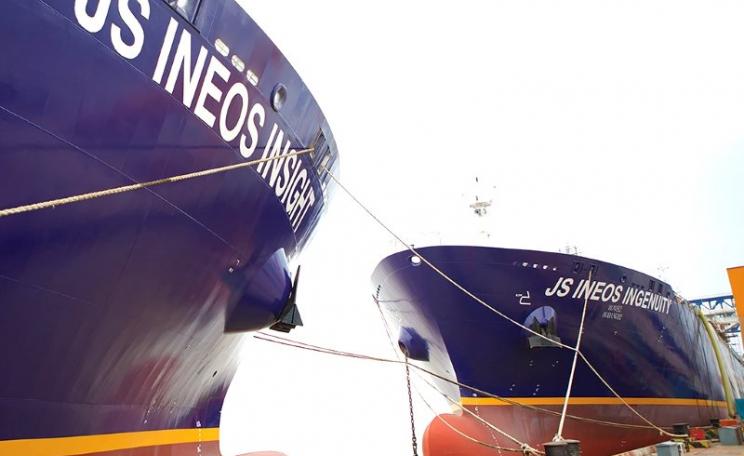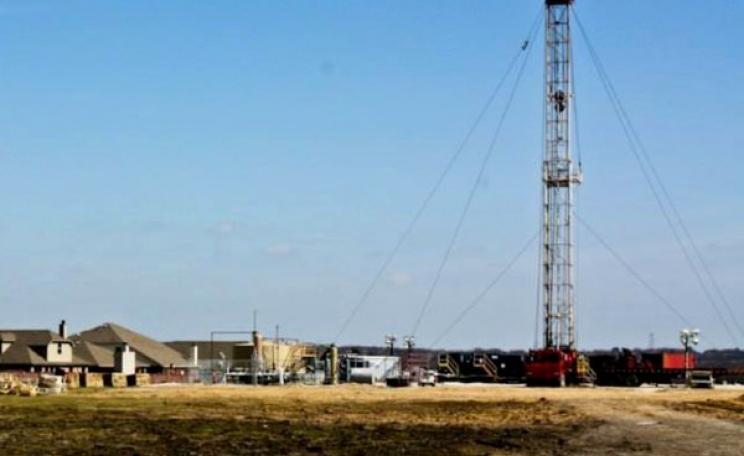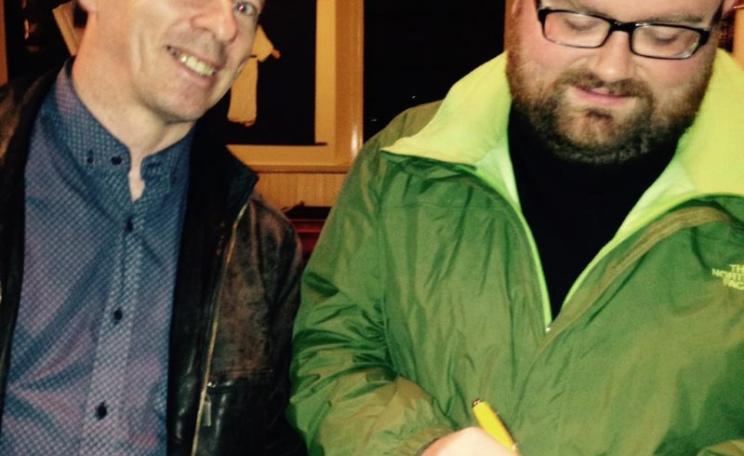At the start it's going to look tiny. But look at a fully-developed shale field - what you see is a checkerboard of roads and pipelines. After twenty, thirty years it'll radically change the landscape. No amount of money in the world will change it back.
Canadian indigenous activist Caleb Behn issued a stark warning from the most heavily-fracked parts of his native land, as he travelled to the UK for screenings of the documentary Fractured Land.
The film tells of the struggle against unconventional gas extraction in British Columbia, and Behn, its protagonist, explained why the story of his territory spurs him on to fight further development.
"This is a country that has a lot of fresh, clean water. A green image. Renewable power. Why put it all at risk?" Caleb Behn is talking of his first impressions when he flew in to Glasgow airport.
Just a few months remain until hydraulic fracturing, an unconventional form of gas extraction, either gets the green light in Scotland - as happened in England four years ago - or is permanently banned.
After two years of campaigning by both industry and activists, people in Scotland are holding their breath to see what the outcome will be. This tension was evident at the Glasgow screening of Fractured Land, the film which documents Behn's work against the 'fracking' that has changed his Canadian home so radically.
Behn, 34, is a First Nations campaigner and former attorney, as skilled in hunting as he is in legal research. He now works heads up Keepers of the Water, an indigenous organisation dedicated to protecting the Artic Ocean Basin from dam development.
The 'one-way street' of oil and gas
Across his family lands - Eh-Cho Dene and Dunne-Za, northeast British Columbia (BC) - the industrial scars of the fracking industry are widespread. Several Canadian provinces have halted the controversial practice, but British Columbia, home to one third of all First Nations people in Canada and famous for its lakes and forests, has seen a rapid expansion of drilling sites.
"When it started for us, it was a few isolated bits, low-risk", Behn explains. "But when you look at what this actually does after twenty or thirty years, it radically changes the landscape. No amount of money in the world can change it back. This is truly a one-way street for your country."
As the countdown to the first fracking sites begins in England, there is hope among activists in Scotland that their government will instead follow Northern Ireland and impose a ban. The research commissioned by the SNP government, published recently, found "some" evidence to link fracking to airborne and waterborne environmental hazards, but failed to come down conclusively either way.
Fractured Land was showing earlier this autumn across Scotland as part of the Take One Action festival, which aims to promote social justice and global change through film. In the film, Behn visits other indigenous peoples across the world, including Aotearoa / New Zealand - a country with a progressive, green image.
At the start it's going to look tiny. But look at a fully-developed shale field - what you see is a checkerboard of roads and pipelines. After twenty, thirty years it'll radically change the landscape. No amount of money in the world will change it back.
But even there he finds Taranaki, a town surrounded by fracking wells, where residents complain of high cancer rates. A Maori elder tells him, in tears, that their concerns have been ignored throughout.
Conflicting identities
The film shows the conflict, both politically and personally, in which the activists are caught up. Behn's own mother works for the oil companies, trying to change the system from the inside. He understands all too well the reasons behind her decision. When he became a lawyer, after years of hard work and reluctant city life, he was torn between two identities, two ways of life. He faced hostility in the legal and professional world, and some too from indigenous communities.
"You've got to dress like a clown if you want to join the circus", Behn says wryly: but putting on that suit meant, for some, that he was no longer one of them. It is obvious that this pains him. But Behn throws himself into work. Having left the legal profession, he has now extensively researched the impact of extractive industries across Canada, the US, and New Zealand, highlighting the 'boom and bust' cycles that the oil and gas sector generates.
The profits "should be used in a good way", says Behn, "and I've never seen extractive industries pay a fair rate to the people and lands they destroy and desecrate."
Currently Behn is working with academics to quantify the longer-term effects of the fracking industry on indigenous public health. In Behn's northeastern BC - or 'Treaty 8 territory' - a report found that 41 billion litres of heavily contaminated water had been injected into a single 50-year-old gas well. Vast quantities of less contaminated water are disposed of in huge ponds.
The 'best science'?
One problem, Behn says, is that the elusive 'best science' - which governments say they'll listen to - doesn't actually exist yet:
"People are getting sick, developing long-latency illnesses that won't fully manifest for twenty, maybe thirty years. In a way that's more terrifying: if someone drops dead today that gets investigated. But if, in a population of 20,000 people, 400 develop a rare form of cancer that doesn't show up for twenty years - that's much harder to trace."
Fracking companies in British Columbia say they adhere to strict regulations on safety and environmental impact. In Scotland, chemicals multinational Ineos, which owns exploration licences for around 700 square miles of the country, maintains that shale gas exploration can be done safely, and that an 'indigenous' shale industry is needed to keep up with energy demand.
But Behn thinks the impact is underestimated. "Scots must understand that fracked wells produce a lot of gas at the start - but they taper off. So to sustain long-term production, you have to keep fracking, keep drilling for years, if not decades.
"So at the start it's going to look tiny. But look at a fully-developed shale field - what you see is a checkerboard of roads and pipelines. After twenty, thirty years it'll radically change the landscape. No amount of money in the world will change it back."
From Pennsylvania to the Firth of Forth
Just a few days after Behn's visit, the first shipment of fracked US shale gas was due to arrive at Ineos' vast petrochemical plant at Grangemouth.
The gas comes from Pennsylvania, where health concerns have become a serious issue. A cursory glance at satellite maps shows the typical fracking landscape - crisscrossing networks of squiggly white lines and drilling stations. One of the companies supplying the ethane was recently fined $4.15m for pollution violations there.
Ineos staged various PR stunts around the arrival of the north American gas, including a 'lone piper' on the pier, and an luxury wine-and-dine trip for journalists. The company is hoping to push ahead with its proposals for hydraulic fracturing across the heavily-populated central belt of Scotland, pending the Scottish Government's final decision, which is expected in spring 2017.
Behn studies a photograph of the sprawling Grangemouth plant, with its chimneys and flares, and the fug that hangs over the neighbouring town. "It reminds me of my territory a lot", he says. "My land is bisected, divided, by pipelines, roads, well sites, pads, all that. It's really hard on my heart."
'Expect resistance'
For Behn the arrival of the US shale gas is an illustration of how interconnected the issue is. He has traveled extensively to talk with indigenous people resisting further oil and gas developments, and describes with passion the protest camps in North Dakota, and in his own county.
"What's happening is a rise of indigenous resistance. The phrase is 'respect existence or expect resistance', because if you don't respect the people's right to say no, or the people's right to clean water, and if you don't respect democratic process or the rule of law - expect us to stand up and oppose.
"But that's terrifying", Behn admits, "because it's a post-9/11 world and right now it looks like things are going to get worse before they get better."
The thousands of indigenous people gathered at Standing Rock, North Dakota, right now would probably not disagree. The water protectors, as they have asked to be known, have for months now been met with extraordinary violence by a militarised police force, as they attempt to stop the construction of a crude oil pipeline.
Tear gas, tasers, concussion grenades, attack dogs and other 'non-lethal' weapons have seen scores of people hospitalised; just days ago a 21-year-old woman was hit with a stun grenade, cutting her arm to the bone. She may lose the limb.
"I wish it wasn't so hard to do right by the people around you and the land that sustains you", Behn concludes, "but that seems to be the way of it in the 21st century." The privilege of travelling and meeting other activists is "bittersweet" for him: "to see these people who love their land and their people, and yet they're suffering for it. I see it a lot in my communities, and I see it here as well."
"If your country decides to go for it, I'd be happy to try and help you avoid the mistakes of my territory. But I hope it doesn't happen."
Jen Stout is a writer and reporter based in Glasgow. Originally from Fair Isle, her background is in campaigns and activism. She is particularly interested in Russia, policing and justice, offshore finance, land reform, surveillance, and LGBT rights, to name a few. Jen previously worked as a reporter for online new media platform CommonSpace, and is now freelance; writing primarily for Bella Caledonia, and for Film & Campaign, which brings new audiences to new documentary films. @jm_stout
News on fracking proposals, campaigns and resistance is available at Frack-Off
Fundraising page for Sophia Wilansky, the woman severely injured by a stun grenade at Standinbg Rock.





